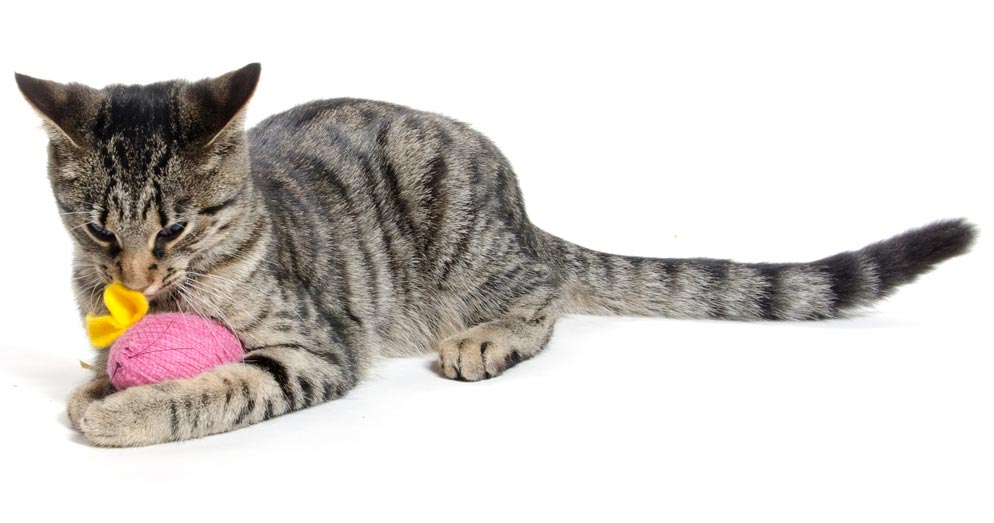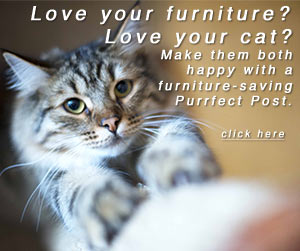Why Does My Neutered Cat Hump Things?

You followed your veterinarian's advice and had your cat neutered (surgically sterilized so he is unable to reproduce). So it's understandable that you were shocked the first time you saw him humping his toy bunny. Or your other cat. Or your leg. It can be funny sometimes but it can also be embarrassing or irritating. It has you throwing your arms in the air and wondering, "Why does my neutered cat hump things?"
There are a few different reasons that cats may display humping behavior (grabbing an object, another cat, or a human body part with their teeth, holding on with the front paws, and thrusting) even after they have been surgically sterilized. Note: Humping behavior is seen in both male and female cats.
- Your cat may still have sex hormones present in his body. The hormones that govern sexual behavior in your cat aren't completely gone the moment that he is neutered. In fact, your male cat can still sire kittens for a short period after the surgery. It takes 6-12 weeks for all of the hormones in circulation to be eradicated. If your cat is humping things and he didn't have his neuter surgery very long ago, this may be why.
- Your cat may have been neutered a little later in life. If your cat's sterilization surgery was done when he was a bit older, say over a year of age, the humping may be ingrained behavior now. Hormone-related behaviors like humping things, wanting to escape and roam, and urine-spraying are often seen to be reduced or never begun when a cat is neutered at 6 months or younger. These behaviors are all a bit harder to eradicate by neutering once they have become routine for your cat. That is not to say that surgery won't eliminate or drastically reduce them but if your cat was older when he was neutered, humping may be part of his behavioral pattern now. He has learned that it feels good.
- Your cat may be feeling stressed by a new addition or change in the home. Humping behavior is sometimes seen in adult cats that have never exhibited it before when there is a stressful circumstance present. This is most often the addition of a new cat. The first cat in the home may hump the new cat. This is usually thought to be stress-related in the first cat. Showing lots of attention to the first cat and trying to keep the rest of his environment and routine as normal as possible will often eliminate this type of humping behavior over time.
- Your cat may need more play time. Humping behavior can sometimes be seen when a cat has pent up physical energy. If your cat has begun humping you or objects in the home, try inserting several extra play sessions into his day to wear him out.
- Your cat may be asking for more attention. Cats who begin humping one or more humans in the home may want more attention. Extra grooming and lap time can help this cat feel more secure and stop humping.
- Older cats may hump kittens. This is most often seen with female, spayed cats. They may grab a kitten in the household by the neck and appear to be humping her. Most cat experts agree that this is likely more of a maternal discipline behavior than a sexual one. Mother cats will often grab their kittens and pin them down to demonstrate that they should stop a certain behavior.
Humping is usually a normal behavior in cats but it can be annoying to humans. If you can identify which of the above circumstances may be behind your cat's humping habit, you can use the knowledge to curb the behavior.
Don't use negative (punishment based) methods if you attempt to stop your cat's humping behavior. They don't work and may make the situation worse if it is related to stress. Use positive reinforcement techniques any time you are trying to modify your cat's actions. Give rewards when your cat does what you want him to do. For instance, when you see him showing signs that he is about to hump his blanket, distract him with a toy and give him lots of praise for playing instead.
You May Also Like These Articles:
Feliway - A Useful Tool to Help Treat Stress in Cats
Interactive Playing with Wand Toys
Why Does My Cat Sleep on My Head?
Notice: Ask-a-Vet is an affiliated service for those who wish to speak with a veterinary professional about their pet's specific condition. Initially, a bot will ask questions to determine the general nature of your concern. Then, you will be transferred to a human. There is a charge for the service if you choose to connect to a veterinarian. Ask-a-Vet is not manned by the staff or owners of CatHealth.com, and the advice given should not delay or replace a visit to your veterinarian.




